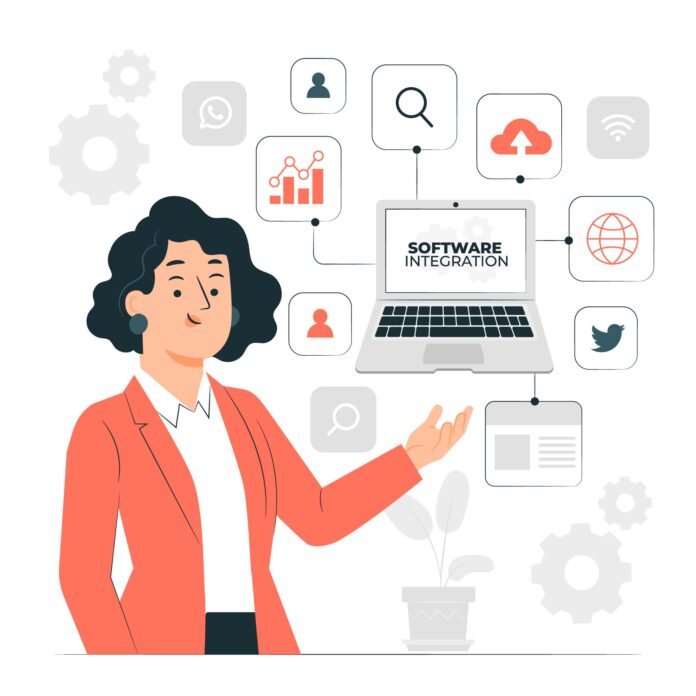In today’s fast-paced digital world, businesses are constantly seeking ways to enhance their connectivity across various applications and systems. This is where iPaaS integration solutions come into play, providing a robust framework to streamline processes and improve operational efficiency. By leveraging these solutions, you can ensure that your organization remains competitive in an ever-evolving market.
What is iPaaS?
iPaaS, or Integration Platform as a Service, is a cloud-based service that facilitates the integration of applications, data, processes, and services across different environments—both on-premises and in the cloud. It allows businesses to connect various systems seamlessly, enabling real-time data flow and collaboration.
Key Features of iPaaS Integration Solutions
Cloud-Based Architecture
One of the primary advantages of iPaaS integration solutions is their cloud-based architecture. By operating entirely in the cloud, these platforms eliminate the need for on-premises hardware and software, reducing the burden on your IT infrastructure. This cloud-native approach offers several benefits:
- Scalability: iPaaS solutions can easily scale up or down based on your integration needs, ensuring that your system can handle sudden spikes in data or application usage.
- Flexibility: With a cloud-based architecture, you can access your integration platform from anywhere, allowing your team to collaborate seamlessly regardless of location.
- Cost-Effectiveness: By eliminating the need for on-premises hardware and software, iPaaS solutions can significantly reduce your upfront and ongoing IT costs.
Pre-Built Connectors and Templates
Another key feature of iPaaS integration solutions is their extensive library of pre-built connectors and templates for popular applications. These connectors act as bridges between your various systems, enabling seamless data flow and integration. Some of the benefits of pre-built connectors include:
- Faster Integration: With pre-built connectors, you can quickly connect your applications without the need for complex coding or custom development.
- Reduced Maintenance: The iPaaS provider typically maintains and updates the connectors, ensuring that they remain compatible with the latest versions of your applications.
- Improved Reliability: Pre-built connectors are thoroughly tested and proven to work, reducing the risk of integration failures or data loss.
Real-Time Data Integration
iPaaS integration solutions enable real-time data integration, ensuring that data is updated across all connected platforms instantly. This feature is particularly important in today’s fast-paced business environment, where timely access to accurate data is crucial for making informed decisions. Real-time data integration offers several benefits:
- Improved Decision-Making: With real-time data, you can make better-informed decisions based on the most up-to-date information available.
- Enhanced Collaboration: Real-time data integration allows teams across your organization to work with the same data, fostering collaboration and reducing the risk of data silos.
- Increased Efficiency: By automating data updates and eliminating manual data entry, real-time integration can significantly improve your team’s productivity and efficiency.
By leveraging these key features, iPaaS integration solutions can help businesses of all sizes streamline their operations, improve data accuracy, and drive innovation in an increasingly digital landscape.
Benefits of iPaaS Integration Solutions
Enhanced Efficiency
By automating integration processes, iPaaS integration solutions significantly reduce the time and resources required to connect disparate systems. This efficiency allows your team to focus on more strategic tasks rather than manual data entry or troubleshooting.
Cost-Effectiveness
Implementing an iPaaS can lead to substantial cost savings by minimizing the need for extensive IT resources and reducing the expenses associated with custom integrations. You can achieve more with less, allowing your organization to allocate funds towards growth initiatives.
Improved Data Accessibility
With all your applications connected through an iPaaS, you gain a unified view of your data. This accessibility enables better analytics and insights, empowering you to make informed decisions quickly.
Scalability and Flexibility
As your business grows, so do your integration needs. iPaaS solutions are designed to scale effortlessly with your organization, allowing you to add new applications or services without significant overhead.
How iPaaS is Shaping the Future of Business Connectivity
Driving Digital Transformation
The shift towards digital transformation is undeniable, and iPaaS integration solutions are at the forefront of this movement. They enable businesses to modernize their operations by integrating legacy systems with new cloud-based applications.
Facilitating Hybrid Integrations
Many organizations operate in hybrid environments that combine on-premises systems with cloud applications. iPaaS provides the necessary tools to connect these diverse systems seamlessly, ensuring smooth data flow across all platforms.
Enabling Automation and AI Integration
With the rise of automation and artificial intelligence (AI), integrating these technologies into your business processes has never been easier. iPaaS solutions allow you to automate repetitive tasks, improving efficiency while reducing human error.
Supporting IoT and Event-Driven Architectures
The Internet of Things (IoT) continues to expand, creating new opportunities for businesses. iPaaS plays a crucial role in managing the vast array of devices and data streams generated by IoT applications, enabling you to leverage this information for better decision-making.
Challenges and Considerations
Security and Compliance Issues
While implementing iPaaS integration solutions offers numerous benefits, it’s essential to address potential security concerns. Ensure that your chosen solution complies with industry standards and regulations to protect sensitive data.
Integration Complexity with Legacy Systems
Integrating legacy systems can pose challenges due to outdated technology or lack of compatibility with modern applications. A well-planned strategy is necessary to ensure a smooth transition without disrupting existing operations.
Vendor Lock-In Concerns
When selecting an iPaaS provider, be mindful of potential vendor lock-in scenarios that may limit your flexibility in the future. Choose a solution that allows for easy migration or integration with other platforms if needed.
Conclusion
The future of business connectivity lies in embracing iPaaS integration solutions. These platforms not only streamline operations but also drive innovation by enabling seamless integrations across various applications and systems. As organizations continue to evolve in a digital landscape, adopting iPaaS will be essential for achieving long-term success.
Now is the time for you to explore how these solutions can transform your business operations—embrace the power of iPaaS today!

